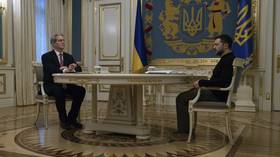Are British ministers guilty of misleading parliament & public on Middle East policy?

The Iraq War was a watershed moment for UK ministers after the British public became far more skeptical of foreign policy decisions taken by their elected officials. But are they still up to their old deceptive tricks?
Middle East Eye journalist, Mark Curtis has written an article suggesting that Tory ministers have been misleading parliament in recent times on a range of British foreign policy issues, ranging from military operations in Syria, to Saudi Arabia operations in Yemen, and arms sales to Israel – yet no dismissals or resignations have followed.
Curtis writes: "Far from being an aberration, ministers misleading the public is as British as afternoon tea."
He highlights the cases of Damian Green and Amber Rudd; ministers who were forced to resign after being found to have misled parliament – Green for having given "inaccurate and misleading" statements about pornography found on his parliamentary office computer, and Rudd, who had “mistakenly” misled parliament over whether the home office had targets for removing illegal immigrants from the UK.
Two Tory ministers have gone for misleading parliament, but as Curtis notes, none have departed over statements concerning matters of Britain's foreign policy.
On Syria, Curtis highlights a statement given by Foreign Office Minister Lord Ahmad in response to questions asked about British military involvement in the war: "In Syria, our military role in the Global Coalition is limited to air strikes to support partner forces on the ground."
However, three weeks later, it was reported that a British soldier had been killed fighting Islamic State in Syria. Reacting to the news, Earl Howe, the defense minister stated that the soldier had been "embedded with US forces."
As Curtis points out, Lord Ahmad had evidently been misleading with his claim that British involvement was "limited to air strikes" – a monumental mistake from the minister or had he knowingly misled parliament? Either way, one could reasonably have expected the minister to stand down over the issue.
Armed Forces Minister Mike Penning stated in March 2017 that, "the UK is not a member of the Saudi-led Coalition and British military personnel are not directly involved in the Saudi-led Coalition's operations in Yemen."
Curtis says we know that not to be true. The UK government has said that around 100 military personnel are working in Saudi Arabia, including at the Saudi MOD and 'operational centres.' The Guardian reported in January 2016 that British military personnel were assisting the Saudis in one such center in Riyadh, responsible for coordinating bombing campaigns in Yemen.
This revelation would appear to cast doubt on the official British government line, that no military personnel are directly involved in Saudi-led operations. The multi-million pound British arms sales to Saudi Arabia, one may argue, hardly supports the government's claims that they have no stake in the ongoing war in Yemen.
The Middle East Eye journalist suggests that ministers omitting critical information, also makes them guilty of misleading parliament. Curtis highlights Foreign Minister Alistair Burt's response to a question about the likelihood of arms that have been exported to Israel having been used to kill or injure Palestinians.
Burt said: "We do not issue export licences where we assess there is a clear risk that the goods might be used for internal repression." His answer did not deal with the specifics, instead choosing to give the government's standard response on arms exports licences.
Is the seemingly unsatisfactory response due to the possibility that British arms exported to Israel may have been used to harm Palestinians? Are strategic interests compromising any chance of principled moral judgements on foreign policy issues?
The Iraq War could have been the landmark moment ministers used to realign British foreign policy with an ethical approach, instead it would appear that the same old bad habits are engulfing foreign policy, that risks further entrenching the public's skepticism.
Omar Baggili, RT Journalist
Like this story? Share it with a friend!

















